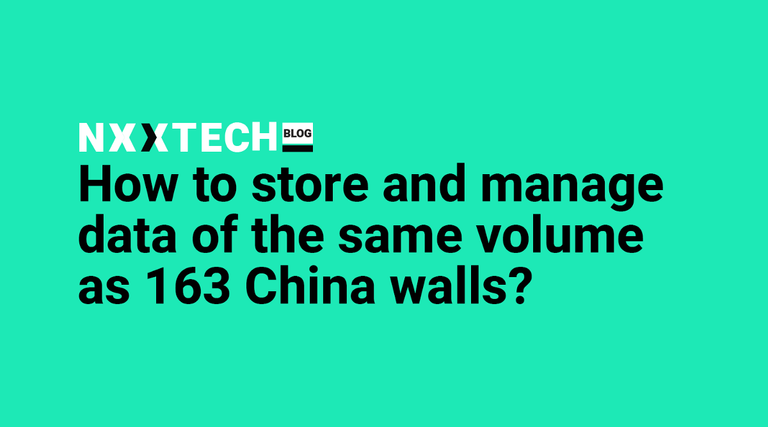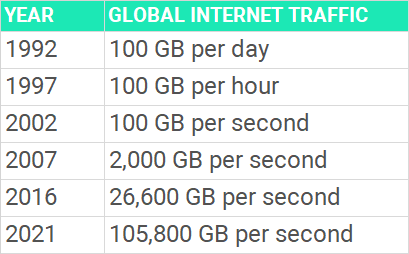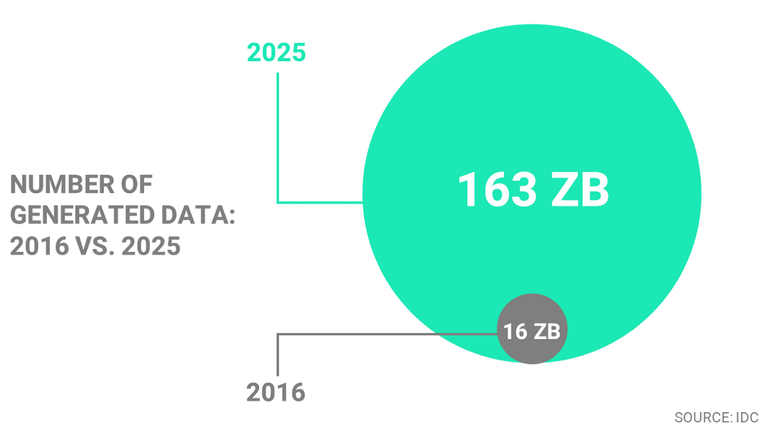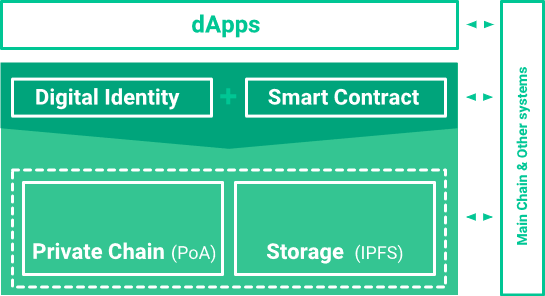The skyrocketing growth of data in a connected world is leading to a worrying perspective on data management and protection. By 2025, we will generate 163 Zettabytes of data, whereas 57% of that information will we stored and owned by enterprises. In comes as no surprise that a number of blockchain solutions address this and offer a fresh perspective into the issue.

Recently, the world has reached an important threshold in the history of Internet. In September 9, 2016 we marked an impressive digital peak when it comes to the amount of data our society generates and entered the era of Zettabyte.
»A zettabyte is a measure of storage capacity and is 2 to the 70th power bytes, also expressed as 10²¹ (1,000,000,000,000,000,000,000 bytes) or 1 sextillion bytes. One Zettabyte is approximately equal to a thousand Exabytes, a billion Terabytes, or a trillion Gigabytes.«
To translate this enormous numbers into the language of “common people”, one Zettabyte has the same volume as the great wall of China. So, just imagine how many data is 163 Zettabytes then!
It is almost impossible to foresee the practical implications of this measure; however, we can easily say the data is becoming critical to almost every operation of our society and in our daily lives and that we are heavily depending on the devices that produce and manage them.

Even more importantly, where the world of IoT and big data intertwine, we suddenly face with a lot of unknowns: how to store data, how to ensure the individuals are protected from unwanted interventions by companies that manage and own their data, as well as how the devices themselves will process and dispose of such data. Are all data even relevant? Is it necessary to store everything? And how can the data be restored to their original form when needed?
A worrying aspect is also from the perspective of users. The research suggests by 2025, 57% of all data (no matter if structured or not) will be stored by enterprise (compared to 30% in 2015). This presents a rising issue for consumers and is also a reason behind stricter GDPR legislation introduced recently. As consumers, we wish to have more control over the overwhelming data and information with which companies interact with us and use their insight to direct us further into their sales funnel.

Consequently, the organizations, and in particular, their CIOs will have to dive deep into the issue as the report shows 85% of the same enterprise data is unstructured, and it is growing 3-times faster as our ability to structure it. Unstructured data includes everything from sales and marketing literature, emails, PDFs, PPT presentations, Excel spreadsheets to customer support data bases, pictures, video and audio files. In other words, companies dispose of useless information. Even though they don’t necessarily use all the information to target and analyze their audience, they need servers to storage them. And, as a recent IBM report suggest, expanding capacity under such a model proves to be costly.
Storage of data is defined as the retention of retrievable data on a computer or other electronic system. This commodity is widely used, and the majority of world`s population uses it on a daily basis: with mobile phones, computers, saved files on USB sticks and similar. Even in this aspect, the “traditional” storage providers have become more rigid in their desire to obtain customers (and mostly, protect their business). This is the reasons many of the storage solutions out there are not compatible, what is of course beneficiary for the enterprise, and a little less convenient for the users. Check our previous blog post to dig into this further.
But, with blockchain, a lot can change! And, compared to cloud storage market which is expected to grow $88,91 billion, according to PR Newswire, decentralized storage solutions are also in the rise, trying to provide answers for the growing need for enterprise mobility and IoT sector in particular.
Blockchain technology and distributed access management could be greatly beneficiary to solve the challenges of data access and ownership, as it could allow individuals to have control over their personal data management while identifying online. However, the problem of (especially public) blockchain ledgers lies in their size and, consequently their scalability as by themselves blockchains are not built for high-volume use-cases.
But, similar to conventional environments, all solutions based on blockchain need to store and retrieve data. For this reason, an alternative approach to decentralized data storage is on the rise, giving companies the possibilities to disperse the data they manage, actively tackle security and data breaches and act more conscientiously with consumer's data. Even more, in comparison with expensive cloud storage systems, decentralized data storage is supposed to be far less expensive.

Storing data on blockchain is possible with the help of IPFS (Inter Planetary File System), from where the data can be fetched anytime by using smart contracts. IPFS is considered to be a new peer-to-peer hypermedia protocol that aims to substitute the HTTP (hypertext transfer protocol) that currently rules the web. On the internet we all know (and use) today, the browsers have to be directly connected to the computers which are serving the specific website. For that, data providers get charged because each network has a peering agreement, while each network hop costs money to the data provider and wastes bandwidth. Even more, HTTP protocol downloads a file from a single computer at a time, instead of getting pieces from multiple computers simultaneously. In contrary, IPFS is similar in nature to bittorent and can take, manage and store files and then track their versions over time. Within our company`s Nxxtech blockchain architecture, IPFS can function as a standalone solution or it can be integrated within your private blockchain.
Are you interested to find out more about decentralized data storage? To adapt the solution to the challenges and specific needs of your organization, visit our website, read our whitepaper or contact our team!

Congratulations @nxxtech! You received a personal award!
You can view your badges on your Steem Board and compare to others on the Steem Ranking
Vote for @Steemitboard as a witness to get one more award and increased upvotes!